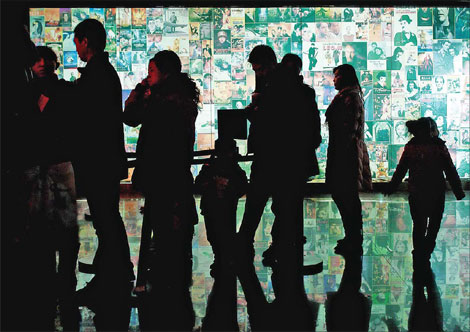Movie
Movie magic
Updated: 2011-02-16 07:53
By Liu Wei (China Daily)
|
Customers at a Zhengzhou cineplex wait for their turn to watch a movie. Sha Lang / CFP |
Nation's theater business is booming as more Chinese take to the cinemas. Liu Wei reports.
Twenty-nine-year-old Shao Yan's earliest memory of a cinema is a hall filled with hundreds of people. In 1980s China, a cinema had just one auditorium. Sitting on wooden chairs, viewers would talk and laugh and leave a thick layer of sunflower seed hulls on the ground.
Now Shao works in Beijing, a city with more than 80 cineplexes, often located in big shopping malls. Popcorn and cola have replaced sunflower seeds even as the auditoriums have become smaller and more comfortable. Going to the cinema is now just part of the whole shopping and eating-out experience, with two hours in a theater rounding off a day's outing.
What has grown rapidly in recent years in China is not only the comfort levels in cinema theaters, but also their number and scale.
A total of 313 new theaters were built in 2010, with 4.2 new screens opening every day. The country now has 6,200 screens, as against just 1,581 in 2002.
Investors are making a beeline for a slice of this booming business. Real estate giant Wanda has built 66 theaters around the country in six years, while film studio/distributor Bona Films has increased the number of its cinemas to 21 in three years. Huayi Brothers, a studio with such smash hits as Aftershock and If You are the One under its belt, has also jumped on the bandwagon, building three theaters in 2010.
Driving this momentum is the soaring box office. According to the State Administration of Radio, Film and TV (SARFT), the country's top regulator of the industry, China's box office revenue reached a record 10.17 billion yuan ($1.5 billion) in 2010, a 63.9 percent increase over the previous year.
Since 2003, China's box office earnings have been growing at an average annual rate of 35 percent. Blockbusters such as Avatar and Aftershock have become the talk of the town. Among the 260 local films and about 20 foreign productions screened in 2010, Avatar grossed 1.3 billion yuan, while Aftershock raked in 670 million yuan.
"Such films work as free advertisements for the cinemas," says Huang Qunfei, general manager of Beijing-based theater chain New Film Association Company. "Many people, especially the older ones who seldom go to the cinemas, have picked up the habit again."
Huang and his fellow cinema managers are thrilled at the surging revenues. At present, nearly 50 percent of a film's box office gross goes to the cinemas, with the production company taking 40 percent and the distributor, 10 percent.
"I expect more than 10,000 screens by the end of 2011," Huang says.
Even so, this lags way behind the United States, which has 40,000 screens.
"We still need more cinemas, especially in the small cities and rural areas. I think 30,000 screens would be adequate to meet the needs in urban areas."
The government shares these projections. In a press conference in January, director Tong Gang of the State Film Bureau said, "We still do not have enough modern cinemas and screens, especially in the middle and small-sized cities".
E-paper

Rise and shine
The Chinese solar energy industry is heating up following recent setbacks in the nuclear sector
Bombs aim for regime change
CSI, with a twist
Literary path
Specials

Peony express
Growers of china's unofficial national flower are reaching out to europe for help

Tea-ing up
More turning to Chinese tea for investment opportunities like vintage wine

A cut above
The ancient city of Luoyang is home to a treasure trove of cultural wonders.

